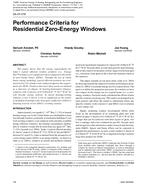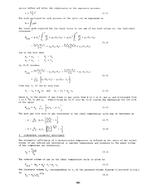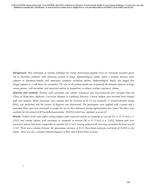Evaluates in both field and laboratory investigations four air conditioning (DBAC) systems that use desiccant wheels to dehumidify air. Examines their sanitising effects on airborne microorganisms. Since bioaerosols are often associated with moisture, examines the potential for their reduction. Observes a decrease between the number of bacteria and fungi entering and exiting the DBAC units. States the decrease in bioaerosols supports the concept that microorganisms are being reduced across the desiccant wheel, although the causal mechanism has not been identified. Concludes that desiccation-based cooling technology should be considered in hospitals, health care and clean room environments where airborne microorganisms are a significant problem. Also suggests that the technology may be helpful in reducing the incidence of building-related illness and hypersensitivity disease in the indoor environment.
Citation: ASHRAE Journal, vol. 39, no. 4, April 1997
Product Details
- Published:
- 1997
- Number of Pages:
- 5
- File Size:
- 1 file , 200 KB
- Product Code(s):
- D-9160


